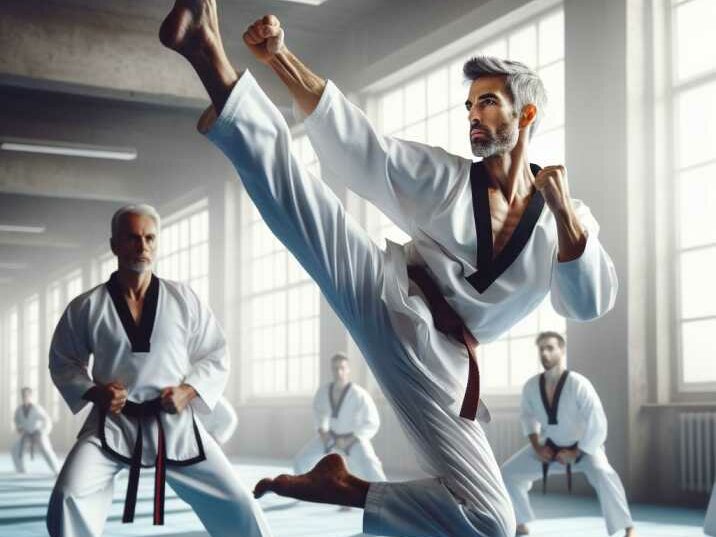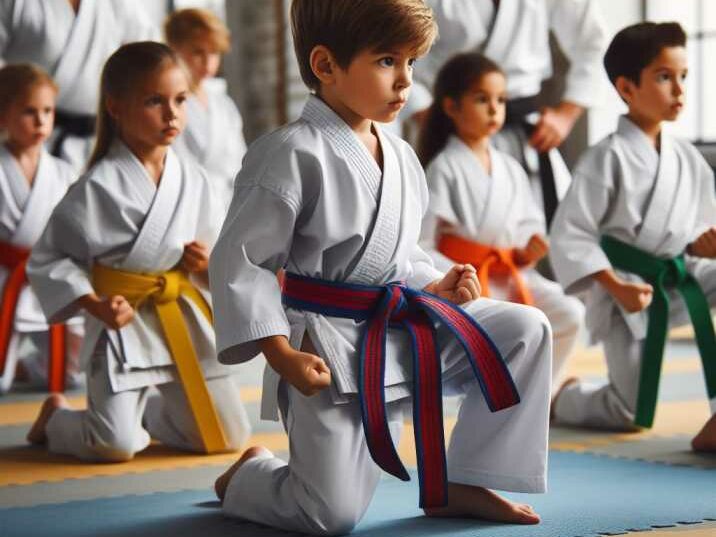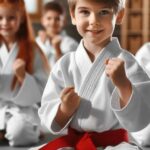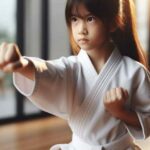Introduction
Table of Contents
Self-confidence is an important trait that helps us face challenges, make decisions, and lead a happy life. One fantastic way is to build self-confidence through martial arts. Martial arts not only teach self-defense but also help develop discipline, respect, and a sense of accomplishment. In this article, we’ll explore how martial arts can boost self-confidence, the benefits for kids and adults, and some inspiring success stories.

Understanding The Self-Confidence Through Martial Arts
Martial arts are systems of combat practices used for self-defense, competition, and physical, mental, and spiritual development. Popular forms include Karate, Taekwondo, Judo, Kung Fu, and Brazilian Jiu-Jitsu. Each has its unique techniques and philosophies, but all share common values that can enhance self-confidence.
Benefits of Martial Arts for Self-Confidence
Discipline and Self-Control
One of the first things students learn in martial arts is discipline. Martial arts require regular practice, following instructions, and adhering to a code of conduct. This helps build self-control and patience, essential for boosting self-confidence.
Physical Fitness
Martial arts training is a full-body workout. It improves strength, flexibility, balance, and endurance. Feeling strong and healthy enhances self-esteem and body image, which are critical components of self-confidence.
Mental Strength
Martial arts also focus on mental toughness. Practitioners learn to overcome challenges, manage stress, and stay calm under pressure. These skills translate to better performance in daily life, increasing overall self-assurance.
Goal Setting and Achievement
In martial arts, students set goals such as earning a new belt or mastering a technique. Achieving these goals gives a sense of accomplishment and boosts self-confidence. It teaches that hard work and perseverance pay off.
Psychological Benefits of Martial Arts
Reducing Anxiety and Depression
Regular practice of martial arts has been shown to reduce symptoms of anxiety and depression. The combination of physical activity, mental focus, and the support of a community provides a strong foundation for mental well-being.
Improving Focus and Attention
Martial arts require intense concentration. This practice of sustained focus can improve overall attention span and cognitive function, which can be beneficial in both academic and professional settings.
Building Resilience
Through martial arts, students learn to face and overcome difficulties. This builds resilience, teaching them to recover from setbacks and continue striving toward their goals with confidence.
Self-Confidence Through Martial Arts for Kids
Developing Respect and Courtesy
Martial arts teach kids to respect their instructors, peers, and themselves. This respect extends to other areas of their lives, improving their relationships and social skills.
Building Focus and Concentration
Children who practice martial arts often show improved focus and concentration in school. The mental discipline required for martial arts helps them stay attentive and perform better academically.
Bullying Prevention
Martial arts give kids the skills to defend themselves if necessary, but more importantly, it builds their confidence to stand up to bullies. Knowing they can protect themselves reduces fear and increases self-confidence.
Physical and Mental Growth
Martial arts also contribute to the physical and mental growth of children. Regular training improves their physical health, while the principles of martial arts help them develop a positive attitude and mental resilience.

Self-Confidence Through Martial Arts for Adults
Stress Relief
For adults, martial arts offer a great way to relieve stress. The physical activity and mental focus required help clear the mind and reduce anxiety, leading to better self-confidence and mental well-being.
Self-Defense Skills
Knowing self-defense techniques boosts confidence in personal safety. Adults feel more secure and capable of handling potential threats, enhancing their overall sense of confidence.
Community and Support
Martial arts classes create a sense of community. Training with others who share similar goals fosters friendships and support networks, contributing to a positive self-image and confidence.
Health Benefits
In addition to boosting self-confidence, martial arts provide numerous health benefits. These include improved cardiovascular health, better coordination, and increased strength and flexibility, all of which contribute to a healthier and more confident self.
Developing Leadership Skills
Taking on Instructor Roles
As students progress, they often have opportunities to assist in teaching lower-ranked students. This role helps develop leadership skills and boosts confidence by reinforcing their knowledge and abilities.
Leading by Example
Martial arts emphasize leading by example. Senior students and instructors model behaviors and techniques for others, teaching them the importance of responsibility, integrity, and confidence.
Public Speaking
Instructors often need to speak in front of groups, explaining techniques and providing feedback. This practice helps improve public speaking skills, which are essential for leadership and self-confidence.
Success Stories for Self-Confidence Through Martial Arts
Inspiring Transformation
Many people have transformed their lives through martial arts. Stories of individuals overcoming obesity, depression, and low self-esteem to become confident, successful martial artists are common. These stories inspire others to believe in their potential and strive for personal growth.
Celebrity Martial Artists
Famous martial artists like Bruce Lee, Jackie Chan, and Chuck Norris have become symbols of confidence and strength. Their journeys show that with dedication and perseverance, anyone can achieve greatness and self-confidence.
Choosing the Right Martial Art
Consider Your Goals
Different martial arts offer various benefits. If your goal is self-defense, consider Brazilian Jiu-Jitsu or Krav Maga. For overall fitness, Taekwondo or Karate might be more suitable. Identifying your goals can help you choose the right martial art for building self-confidence.
Research Schools and Instructors
Not all martial arts schools are the same. Research local schools, read reviews, and meet the instructors. A good instructor can make a significant difference in your martial arts journey and your confidence-building process.
Try Before You Commit
Many martial arts schools offer trial classes. Take advantage of these opportunities to see if the style and environment suit you. Feeling comfortable and motivated in your training space is essential for long-term success and confidence building.
Martial Arts and Personal Development
Life Skills
Martial arts teach valuable life skills such as time management, goal setting, and leadership. These skills are transferable to other areas of life, further enhancing self-confidence and personal growth.
Overcoming Challenges
Martial arts training involves facing and overcoming various challenges. This process teaches resilience and the ability to handle adversity, which boosts self-confidence in everyday life.
Mindfulness and Meditation
Many martial arts incorporate mindfulness and meditation practices. These techniques help practitioners stay present, reduce stress, and maintain mental clarity, all of which contribute to a more confident and centered self.
Martial Arts and Academic Performance
Improved Academic Skills
Studies have shown that children who practice martial arts often see improvements in their academic performance. The discipline and focus required for martial arts training translate to better study habits and higher grades in school.
Time Management
Martial arts teach students how to manage their time effectively. Balancing training with schoolwork and other activities helps children develop strong time management skills that are beneficial throughout their lives.
Martial Arts and Family Bonding
Family Classes
Many martial arts schools offer family classes where parents and children can train together. This shared activity strengthens family bonds and provides a unique way to support each other’s growth and confidence.
Role Models
Parents who practice martial arts set a positive example for their children. Seeing their parents work hard and achieve their goals inspires children to do the same, fostering a confident and goal-oriented mindset.
Cultural Awareness and Respect
Learning About Different Cultures
Martial arts often come with rich cultural histories. Learning about these traditions helps students develop a greater appreciation for different cultures, promoting respect and understanding.
Building a Global Community
Practicing martial arts connects individuals to a global community of practitioners. This sense of belonging and shared purpose can greatly enhance self-confidence and a sense of identity.
With these additional sections, the article now provides an even more comprehensive look at how martial arts can build self-confidence, touching on various aspects such as academic performance, family bonding, and cultural awareness.
Table of Information about Self-Confidence through Martial arts:
| Key Points | Details |
|---|---|
| Benefits of Martial Arts | Discipline, Respect, Physical Fitness, Mental Strength |
| Popular Martial Arts | Karate, Taekwondo, Judo, Kung Fu, Brazilian Jiu-Jitsu |
| Key Skills Developed | Focus, Perseverance, Self-Control, Self-Discipline |
| Suitable for All Ages | Programs available for children, teens, and adults |
| Famous Martial Artists | Bruce Lee, Jackie Chan, Chuck Norris |
Conclusion
In Conclusion, How to build Self-Confidence through martial arts. Martial arts offer a powerful path to building self-confidence for people of all ages. The discipline, physical fitness, mental strength, and community support gained through martial arts training help individuals overcome challenges and believe in themselves. Whether you’re a child facing bullies at school, an adult looking to relieve stress, or anyone wanting to improve self-esteem, martial arts can be a transformative journey.
FAQs
- What age can children start martial arts?
- Children can start martial arts as early as age 4 or 5, depending on the program and the child’s maturity level.
- Are martial arts safe for kids?
- Yes, martial arts are generally safe for kids. Classes are designed to be age-appropriate and emphasize safety and proper technique.
- Can adults with no experience start martial arts?
- Absolutely! Martial arts programs often have beginner classes tailored for adults with no prior experience.
- Do martial arts promote violence?
- No, martial arts teach respect, self-control, and non-violence. The focus is on self-defense and personal development.
- How often should one practice martial arts to see benefits?
- Practicing martial arts 2-3 times a week is usually sufficient to see improvements in fitness, skills, and self-confidence.


